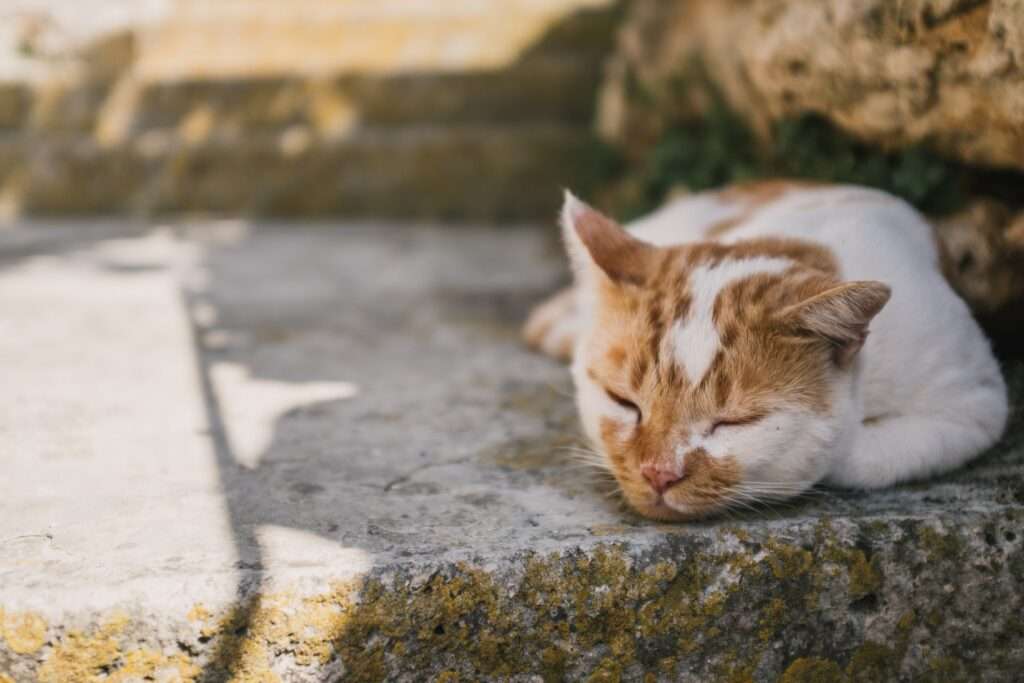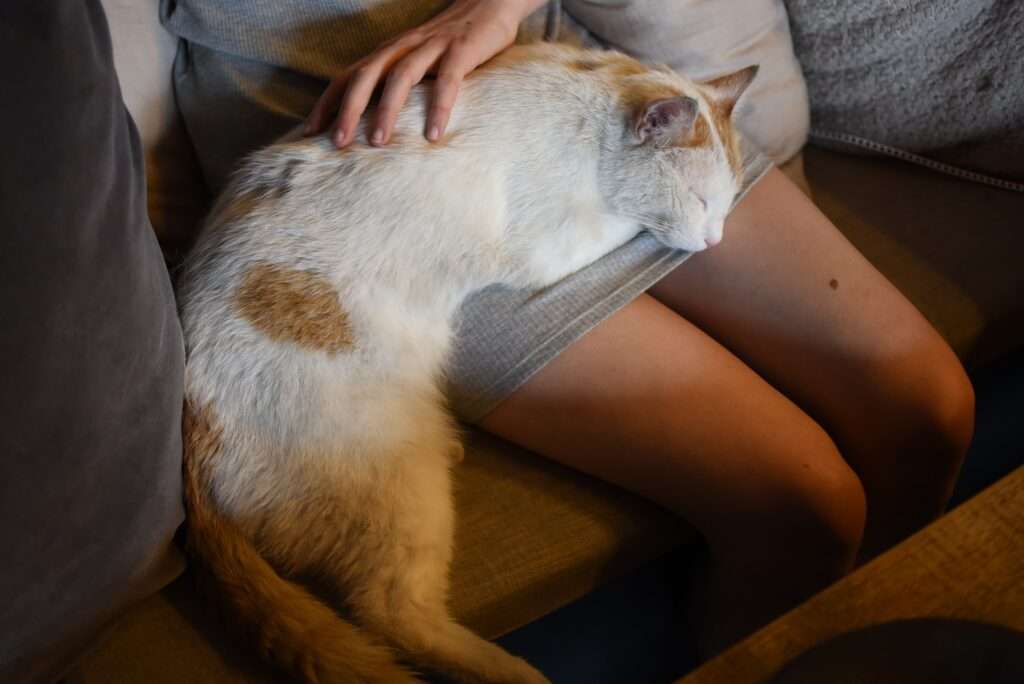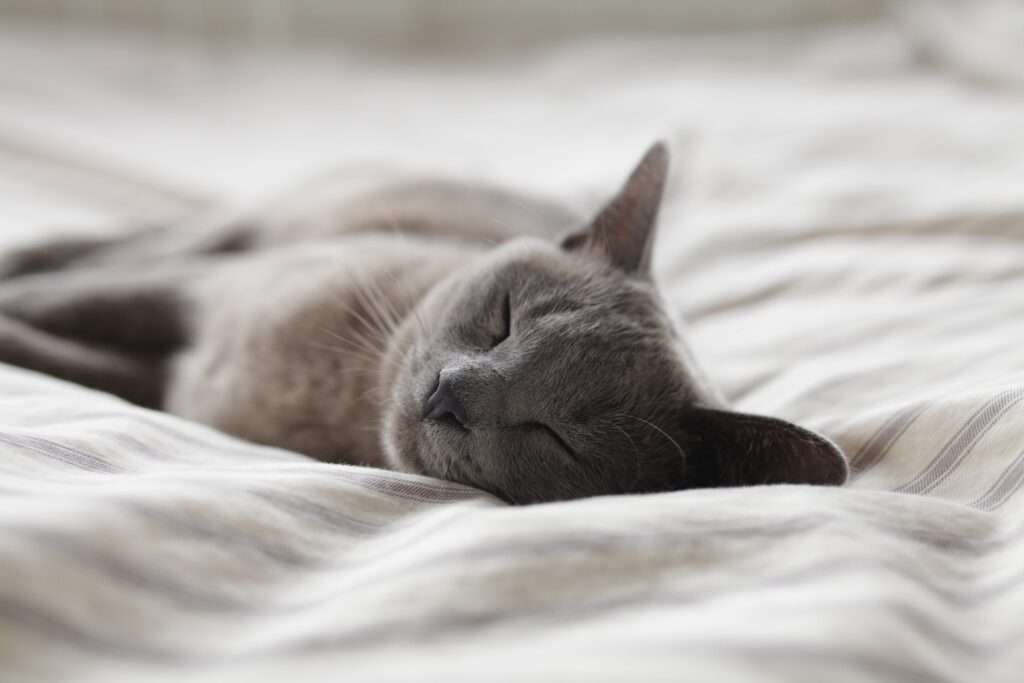Should I Leave My Dying Cat Alone? Making the Heartbreaking Decision
Losing a beloved pet can be an incredibly difficult experience for any pet owner, and the decision of whether to stay with a dying cat or not is a particularly tough one. As a pet owner, it’s natural to want to offer your furry companion comfort and solace during their final moments.
However, it’s also understandable to feel overwhelmed by the emotional weight of being present during this challenging time. At BarkLikeMeow, we understand the importance of providing guidance and support to pet owners who are grappling with this decision, which is why we’ve put together this comprehensive guide to help you make the best decision for you and your cat.
Understanding a Cat’s End-of-Life Process

It’s crucial to keep in mind that every cat’s end-of-life process is unique. However, there are some common signs and behaviors that can help pet owners recognize when their cat is nearing the end of their life. Cats tend to become more lethargic and may lose interest in food or water as they approach the end of their life. They may also experience breathing difficulties, and their heartbeat may become weaker.
As a pet owner, it can be challenging to know how to support your cat during this time. Understanding the end-of-life process can aid you in making informed choices regarding whether or not to stay with your cat. In the following segment of this guide, we’ll examine several aspects that you should evaluate when making this challenging decision.
Factors to Consider When Deciding Whether to Stay with Your Dying Cat
When deciding whether to stay with your dying cat, there are several factors that you should consider. Your emotional condition is one of the most critical aspects to consider. It’s natural to feel overwhelmed and emotional when your cat is nearing the end of their life, and you may find it difficult to be present during this time.
However, it’s also important to remember that being present with your cat can provide them with comfort and support during their final moments. Another factor to consider is your cat’s personality and temperament. Some cats may prefer to be left alone during this time, while others may crave the comfort and support of their owner. You know your cat best, so it’s important to consider their individual needs and preferences when making this decision.
Lastly, consider your own personal beliefs and values. For some pet owners, being present during their cat’s final moments is an important part of the grieving process. For others, the thought of being present during this time is too difficult to bear. It’s important to be honest with yourself about what you can handle emotionally and make the decision that feels right for you.
Providing Comfort and Support to Your Dying Cat
If you opt to remain with your cat during their final moments, there are numerous ways you can offer them comfort and assistance. Primarily, ensure that your cat is at ease and has access to food, water, and a sanitary litter box. You may also want to provide your cat with soft blankets and pillows to help them feel more comfortable.
It’s also important to provide emotional support to your cat during this time. Sit with them, talk to them, and offer them gentle pets and cuddles if they are receptive to it. Remember, your presence alone can provide comfort to your cat during this difficult time.
In the upcoming section of this guide, we’ll cover some of the methods that you can implement to tend to your emotional well-being during this challenging time.
Understanding the Benefits of Being Present with a Dying Cat

While it can be difficult to be present with a dying cat, there are also many benefits to staying with your furry friend during their final moments. For one, being present with your cat can provide them with comfort and support during a time when they may be feeling scared or confused. Your presence can help to reassure them and let them know that they are not alone.
Being present with your cat can also be an important part of the grieving process for pet owners. It allows you to say goodbye to your furry friend and provide them with the love and care that they need during their final moments. This can be a deeply emotional and cathartic experience that can help with the healing process after your cat has passed away.
Understanding the Risks of Being Present with a Dying Cat
While being present with a dying cat can be a deeply rewarding and emotional experience, it’s important to understand that there are also risks involved. For one, being present during this time can be emotionally overwhelming and can take a toll on your mental health.
It’s important to be honest with yourself about what you can handle emotionally and to seek support if you need it. There are also physical risks involved with being present with a dying cat. For example, your cat may become agitated or disoriented during this time and could unintentionally scratch or bite you.
Additionally, if your cat has a contagious illness, there is a risk of transmission to you or other pets in the household. It’s important to weigh the benefits and risks of being present with your cat during their final moments and to make the decision that feels right for you and your furry friend.
Alternatives to Being Present with a Dying Cat
If you have decided that being present with your dying cat is not the right choice for you, there are still ways that you can provide them with comfort and support during this time. One option is to hire a professional pet sitter or veterinarian to care for your cat in their final moments. These professionals are trained to provide compassionate care to pets and can ensure that your cat is comfortable and well-cared for.
Another option is to create a comfortable and quiet space for your cat to spend their final moments. This may involve providing them with soft blankets, pillows, and a comfortable bed, as well as ensuring that they have access to food, water, and a clean litter box. You may also want to play soft music or provide them with comforting scents to help them feel more relaxed.
Preparing for the Death of a Pet
Making preparations for the passing of a pet can be an emotional and challenging process, but it’s crucial to allocate the necessary time to arrange and guarantee that your beloved companion receives the care and respect they deserve. One important step is to discuss your wishes with your veterinarian and create a plan for your cat’s end-of-life care.
This may involve making decisions about pain management, euthanasia, and other end-of-life considerations. You may also want to consider creating a memorial or tribute to your cat after they have passed away. This could involve creating a scrapbook or photo album, planting a tree or memorial garden in their honor, or making a donation to a pet-related charity in their name.
While the passing of a pet can be a challenging and emotional experience, it’s crucial to allow yourself the time to grieve and pay tribute to your furry companion’s memory. Several resources and assistance are accessible to pet owners coping with this loss, including counseling, support groups, and online communities that offer the chance to connect with others who are experiencing similar feelings.
Supporting a Dying Cat in Their Final Days

If you have decided to be present with your dying cat, there are many ways that you can provide them with comfort and support during their final days. One important step is to create a quiet and peaceful space for your cat to rest, away from any loud noises or disruptions. You may also want to provide them with soft bedding, blankets, and pillows to help keep them comfortable.
It’s also important to provide your cat with plenty of love and attention during their final days. This may involve spending time with them, petting and comforting them, and talking to them in a soft and soothing voice. You may also want to provide them with their favorite treats and toys to help keep them happy and engaged.
Another important aspect of supporting a dying cat is monitoring their symptoms and behavior. This can help you to identify any changes or issues that may require medical attention, such as difficulty breathing or decreased appetite. If you notice any concerning symptoms, it’s important to contact your veterinarian right away.
Seeking Professional Guidance
If you are struggling with the decision to stay with your dying cat or are unsure of how to provide them with the best possible care, it may be helpful to seek professional guidance. Your veterinarian can offer you beneficial insights and guidance regarding end-of-life care, helping you make informed decisions about your cat’s comfort and health.
In addition to your veterinarian, there are many other resources available to pet owners who are going through this difficult time. This may include pet hospice services, grief counseling, and support groups for pet owners who have lost a furry friend. These resources can provide valuable guidance and support as you navigate the challenges of caring for a dying pet.
Coping with the Loss of a Pet
Losing a pet can be an incredibly difficult and emotional experience. It’s crucial to acknowledge that it’s perfectly normal to grieve and to allocate the necessary time to deal with the emotions that come with losing a pet. There are various methods to manage the loss of a pet, and it’s important to recognize that what may be effective for one individual may not be helpful for someone else.
Some common coping strategies include:
- Talking to friends and family about your feelings
- Participating in pet loss support groups or grief counseling
- Creating a memorial for your pet, such as a scrapbook or photo album
- Volunteering at an animal shelter or rescue organization in honor of your pet
- Seeking comfort in nature or engaging in self-care activities, such as exercise or meditation
It’s essential to keep in mind that there’s no right or wrong approach to cope with the loss of a beloved pet. It’s important to allow yourself to feel and process your emotions in your own way and at your own pace.
Conclusion and Next Steps
In conclusion, the decision to stay with a dying cat is a deeply personal one that should be made based on your individual needs and the needs of your furry friend. While being present with a dying cat can be a difficult and emotional experience, it can also provide you with the opportunity to provide comfort and support to your furry friend during their final days.
Should you decide to stay with your cat during their final days, it’s crucial to be aware of the advantages and disadvantages that come with this decision. Moreover, it’s vital to offer your furry friend the affection and care they require during this challenging time.
This may involve creating a quiet and peaceful space for your cat to rest, providing them with comfort and attention, monitoring their symptoms and behavior, and seeking professional guidance when necessary. If you choose not to be present with your cat, there are many alternative forms of care that can provide them with comfort and support. These may include pet hospice services, in-home euthanasia, or palliative care.
Remember, whether you choose to stay with your cat or provide them with alternative forms of care, it’s important to prioritize their comfort and well-being during this difficult time. By seeking professional guidance and providing your cat with the love and support they need, you can help to ensure that their final days are filled with comfort, peace, and dignity.
Frequently Asked Questions
Should I leave my dying cat alone?
It is generally not recommended to leave a dying cat alone. Cats need their owners close to them in their final moments of life. However, it is important to make sure that your cat is comfortable and not stressed during this time.
What are the signs that my cat is dying?
Some common signs that a cat is approaching the end of its life include lethargy, loss of interest in food or water, breathing difficulties, and a weaker heartbeat. However, it’s important to remember that every cat is different, and some cats may not show any obvious signs of decline.
How can I support my dying cat?
There are several things you can do to support your dying cat, including providing a comfortable and stress-free environment, offering your cat water and food if they are interested, and spending time with your cat to provide comfort and companionship. It’s also important to consult with your veterinarian to ensure that your cat is comfortable and receiving appropriate care.
How can I tell if my cat is in pain?
Signs that your cat may be in pain include vocalization, hiding, aggression, changes in appetite or litter box behavior, and changes in posture or gait. If you suspect that your cat is in pain, it’s important to consult with your veterinarian to determine the best course of action.
What can I do to make my cat more comfortable in its final days?
Some things you can do to make your cat more comfortable include providing soft bedding, keeping the environment quiet and stress-free, and offering your cat water and food if they are interested. You can also talk to your veterinarian about pain management options and other supportive care measures.
Should I consider euthanasia for my dying cat?
Euthanasia may be a humane option for cats who are suffering and have a poor quality of life. It’s important to discuss this option with your veterinarian and make the decision that is best for your cat and your family.
How can I cope with the loss of my cat?
Coping with the loss of a pet can be difficult. Some things you can do to cope include seeking support from friends and family, joining a pet loss support group, and engaging in self-care activities like exercise or meditation.
Can I bury my cat in my backyard?
Laws regarding pet burial vary by location. It’s important to check with your local government to determine if pet burial is legal in your area. If you are unable to bury your pet, cremation may be an option.
Should I get another cat after my cat passes away?
The decision to get another cat after your cat passes away is a personal one. It’s important to take time to grieve and consider whether you are ready for another pet. When you are ready, consider adopting a cat from a local shelter or rescue organization.
How can I honor the memory of my cat?
There are many ways to honor the memory of a beloved pet, including creating a memorial, making a donation to a pet charity, or volunteering at a local animal shelter. You can also share stories and photos of your cat with friends and family to keep their memory alive.





